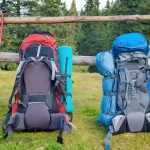

Hello, fellow nature lovers! As a travel writer and avid camper, I cannot emphasize enough the importance of practicing Leave No Trace principles when exploring the great outdoors. Leave No Trace is a set of outdoor ethics that promotes responsible and sustainable outdoor recreation. Whether you are embarking on a weekend camping trip or a multi-day hike, it is essential to minimize your impact on the environment and preserve the natural beauty for future generations.
So, what are the seven principles of Leave No Trace, you ask? Let’s delve into each of them with a burst of excitement and perplexity:
1. Plan Ahead and Prepare
The first principle of Leave No Trace is to plan ahead and prepare. This is more than just packing the right gear and checking the weather forecast. It means understanding the rules and regulations of the area you will be visiting, researching the terrain and weather conditions, and being prepared for any unexpected situations that may arise.
For example, if you plan on hiking in a remote area, you should carry a map and compass, extra food and water, and a first aid kit. You should also inform someone of your itinerary and expected return time. This way, if you encounter unexpected challenges, you will be better equipped to handle them and minimize your impact on the environment.
2. Travel and Camp on Durable Surfaces
When exploring the great outdoors, it’s essential to minimize your impact on the environment by choosing durable surfaces for travel and camping. This means avoiding fragile soils and vegetation, as they are easily damaged by human activity. Instead, look for established trails and campsites, or choose durable surfaces such as rock, sand, or gravel.
By camping on durable surfaces, you can prevent long-term damage to the ecosystem and ensure that future generations can enjoy the same beauty. If you are camping in a backcountry area, it’s also important to spread out your impact by using different campsites each night and avoiding high-use areas.
3. Dispose of Waste Properly
One of the most important Leave No Trace principles is to dispose of waste properly. This means packing out all trash and leftover food, burying human waste at least 200 feet from water sources and campsites, and using biodegradable soap for cleaning dishes and personal hygiene.
[amazon box=”B07FXZHX41″ description=”campsuds is an ecologically conscious soap for camping that is made from all-natural ingredients that degrade over time in an outdoor environment.” template=”horizontal”]
When disposing of waste, it’s important to remember that even small items like apple cores and orange peels can have a significant impact on the environment. These items can take years to decompose and attract wildlife that may become dependent on human food. By following proper waste disposal techniques, you can help minimize your impact on the environment and ensure a healthier ecosystem.
4. Leave What You Find
As tempting as it may be to take a souvenir from your outdoor adventure, it’s essential to leave everything as you found it. This means not picking flowers, removing rocks or artifacts, or damaging trees and vegetation. The natural beauty of the outdoors is what draws us to explore it, and it’s important to preserve it for future generations.
It’s also important to respect cultural and historical sites when exploring the outdoors. These sites may have significant cultural or historical significance to local communities, and it’s crucial to preserve them for future generations to learn from and appreciate.
5. Minimize Campfire Impact
Campfires are an essential part of camping for many people, but they can have a significant impact on the environment if not managed properly. When building a fire, use established fire rings or fire pans, keep the fire small, and burn only small sticks and twigs. It’s important to avoid cutting down trees or breaking branches for firewood, as this can have a significant impact on the local ecosystem.
When it’s time to leave, it’s crucial to fully extinguish the fire and pack out any remaining debris. This helps prevent wildfires and ensures that future visitors can enjoy the same beauty of the outdoors.
Read more on Sustainable Campfires in our blog post.
6. Respect Wildlife
As outdoor enthusiasts, it’s important to respect the wildlife that calls these places home. This means observing wildlife from a distance, not feeding or approaching animals, and storing food and trash in bear-resistant containers. It’s also important to understand the behavior of the wildlife in the area you are visiting, and to make noise when hiking to avoid surprising animals.
Interacting with wildlife in their natural habitats can be a unique and rewarding experience, but it’s important to remember that these animals are not pets and should be treated with respect and caution.
7. Be Considerate of Other Visitors
The final Leave No Trace principle is to be considerate of other visitors. This means being respectful of their experience by keeping noise levels down, respecting their privacy, and yielding to other hikers on the trail. It also means being aware of cultural differences and respecting the local customs and traditions.
By being considerate of other visitors, we can all enjoy the beauty of the outdoors without negatively impacting each other’s experiences.
In conclusion, Leave No Trace principles are essential for responsible and sustainable outdoor recreation. By following these seven principles, we can minimize our impact on the environment and ensure that future generations can enjoy the same beauty of the outdoors. Remember to plan ahead and prepare, travel and camp on durable surfaces, dispose of waste properly, leave what you find, minimize campfire impact, respect wildlife, and be considerate of other visitors. Happy trails!
Author

Sarah Patel
Sarah is a travel writer and photographer, with a passion for exploring new destinations and cultures. She's traveled extensively throughout the world and has written for several major travel publications. Sarah is also an avid camper and outdoor enthusiast, and loves to combine her love of travel with her love of the outdoors. She's always on the lookout for unique and off-the-beaten-path campsites
Recent Posts


